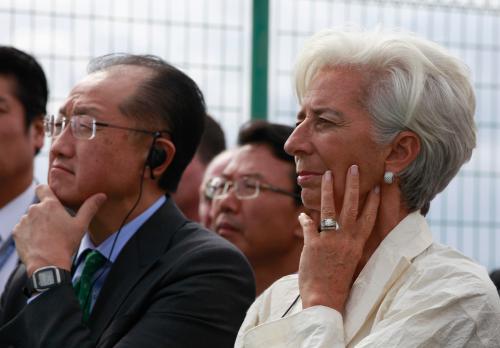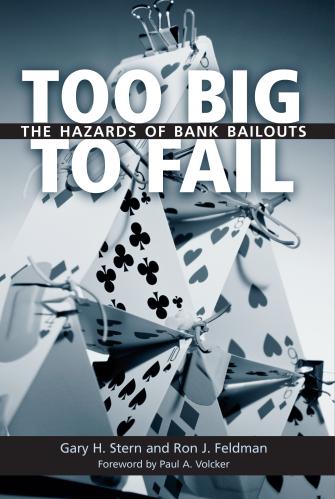Gordon Brown, many in the European Union and the media have been calling for a “Bretton Woods II” as the next step toward preventing future meltdowns of the international financial system. One problem with this proposal is that it implicitly lumps the World Bank with the International Monetary Fund. An international conference will be required to make the financial architecture more effective in preventing mega-crises, but the outcome is likely to be more satisfactory if it begins by focusing on the International Monetary Fund (IMF).
While it may make sense to give responsibility for supervising globally active financial firms to a new purpose-built institution, the goal of international financial stability will not be achieved unless the new institution is linked to a strengthened IMF.
Leaving the World Bank for later
The argument for leaving the World Bank out of this vital policy debate is relatively straightforward. Unlike the IMF, the World Bank has no mandate to establish rules for the international financial system.
It does have competence in fostering financial sector soundness in emerging market countries, but not in the advanced countries where the current turmoil began.
The World Bank’s charter is no obstacle to helping emerging market countries implement new rules and achieve high standards of soundness. Consequently, bringing the World Bank into the debate about the international system will mostly complicate the process.
Revamping the World Bank
Do not interpret this as an argument for leaving the World Bank alone. Indeed, to live up to its potential as a truly multilateral instrument focused on cross-border problems ranging from poverty to global warming, the World Bank’s charter will have to be amended to produce a credible governance structure, or to allow bolder actions such as moving the World Bank’s headquarters to Europe.
But such steps are best pursued on a separate track at a later date.
The IMF and the USA
A second problem with the Bretton Woods II proposal is that nothing useful can emerge until the United States is ready to stop using the IMF as an instrument of U.S. policy.
From its inception, the United States has used the IMF as a vehicle for delivering messages to other countries about their policy weaknesses.
But why should rising powers such as China and India pay attention to the IMF’s advice when the United States (and the “old powers” of Europe) routinely dismiss the IMF’s critiques?
Checks and balances
Think of the IMF as a public health physician. In addition to being responsible for identifying and treating victims of contagious diseases, it has a critical preventive responsibility — to look at the system as a whole, detect weaknesses and recommend corrective action.
Today, the United States is not politically or emotionally ready to listen to, let alone adopt, the IMF’s advice.
Tragic irony
There is a tragic irony here. Domestically, the United States is a fervent believer in checks and balances. Internationally, however, having successfully fought off the existential challenge of communism, the United States behaves as if it alone knows best how to deal with every other global challenge.
After fighting enemies in Afghanistan and Iraq for more years than World War II, with victory still elusive, Americans are beginning to comprehend the difficulty of trying to re-make the world in their image. But moving into listening mode represents a 180-degree turn.
A catalyst for change
The election of Barack Obama as the next President of the United States provides some basis for optimism about a course correction of this magnitude, but the political headwinds will be strong.
Specific improvements that may be required to transform the IMF into an effective public health physician for the international financial system involve painful steps.
Some measures to be considered include: giving up the U.S. veto, supporting a large quota (capital) increase, allowing the IMF to sell its gold freely and giving the IMF formal jurisdiction over capital movements. Each of these improvements will be fought by self-appointed “guardians” of U.S. supremacy.
A first step for Barack Obama, possibly in his Inaugural Address on January 20, will be to sketch out a foreign policy framework that is more multilateral in character. A second step will be to establish a bipartisan coalition in the U.S. Congress prepared to support changes that will be attacked for ceding sovereignty to the IMF.
Gaining more support
Getting bipartisan support is critical because the worst possible outcome is to negotiate a package of improvements with the other countries and then have it rejected by the U.S. Congress.
That happened with the International Trade Organization, the third global institution discussed at the Bretton Woods Conference in 1944.
Creating a credible negotiating process
Finally, great sensitivity will be needed to design a credible negotiating process. A process involving all 185 members of the IMF cannot be successful. A process limited to the G-8 cannot be successful. The extraordinary G-20 summit that will be held in Washington on November 15 might be helpful in convincing the American public of the importance of a process that gives the rising powers a meaningful role.
But finance ministers should lead the negotiations, not heads of state. Barack Obama should be shaping the negotiating mandate, not George W. Bush. The U.S. position on the mandate should be decided after January 20 based on a thorough vetting process and close consultations with our major international partners.
The Brookings Institution is committed to quality, independence, and impact.
We are supported by a diverse array of funders. In line with our values and policies, each Brookings publication represents the sole views of its author(s).








Commentary
Op-edBuilding a Better Global Financial System
November 12, 2008